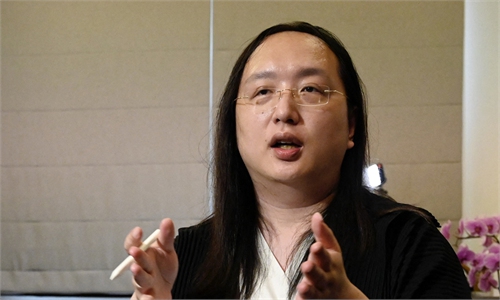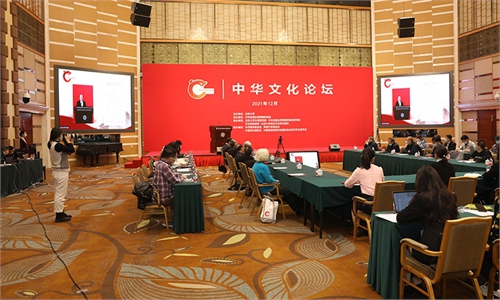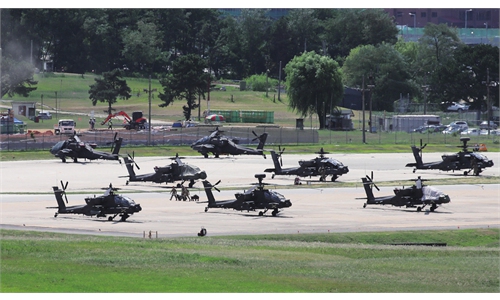GT investigates: Why is national reunification an unshakable demand?
Rising sentiment of solving Taiwan question by force ‘caused by DPP, US’
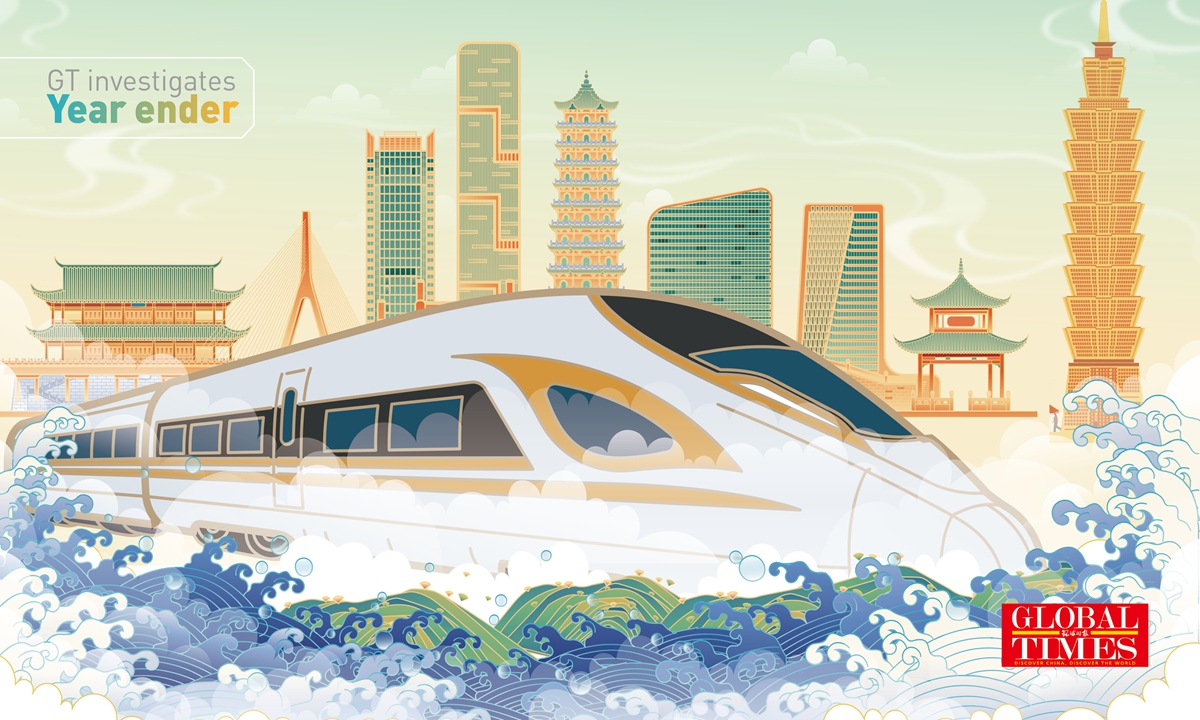
GT investigates Year ender.Graphic:GT
Editor's Note:
The cross-Taiwan Straits situation has become increasingly intense in 2021, with international observers and media raising concerns over a potential China-US conflict in the region in the near future. Few outside China understand why national reunification with Taiwan is perhaps the biggest and most unshakable desire shared by the whole Chinese nation, and why the Chinese mainland has such an unshakable determination to realize this goal.
The Global Times is trying to get to the bottom of the matter by reaching interviewees from both the mainland and the island. We speak to university students, businesspeople, ordinary people, online influencers who made popular works like cartoons and songs that express the rising sentiment for reunification in the mainland, as well as the scholars who focus on politics, international relations and the Taiwan question.
This is the first of a two-part story, which gives the background to why reunification is so important for Chinese, and why the hawkish sentiment over the Taiwan question which urged reunification by force has risen sharply this year. The second part focuses on the voices of the people from Taiwan about their thoughts on reunification, and analyzes the development of the situation. The second part is available here.
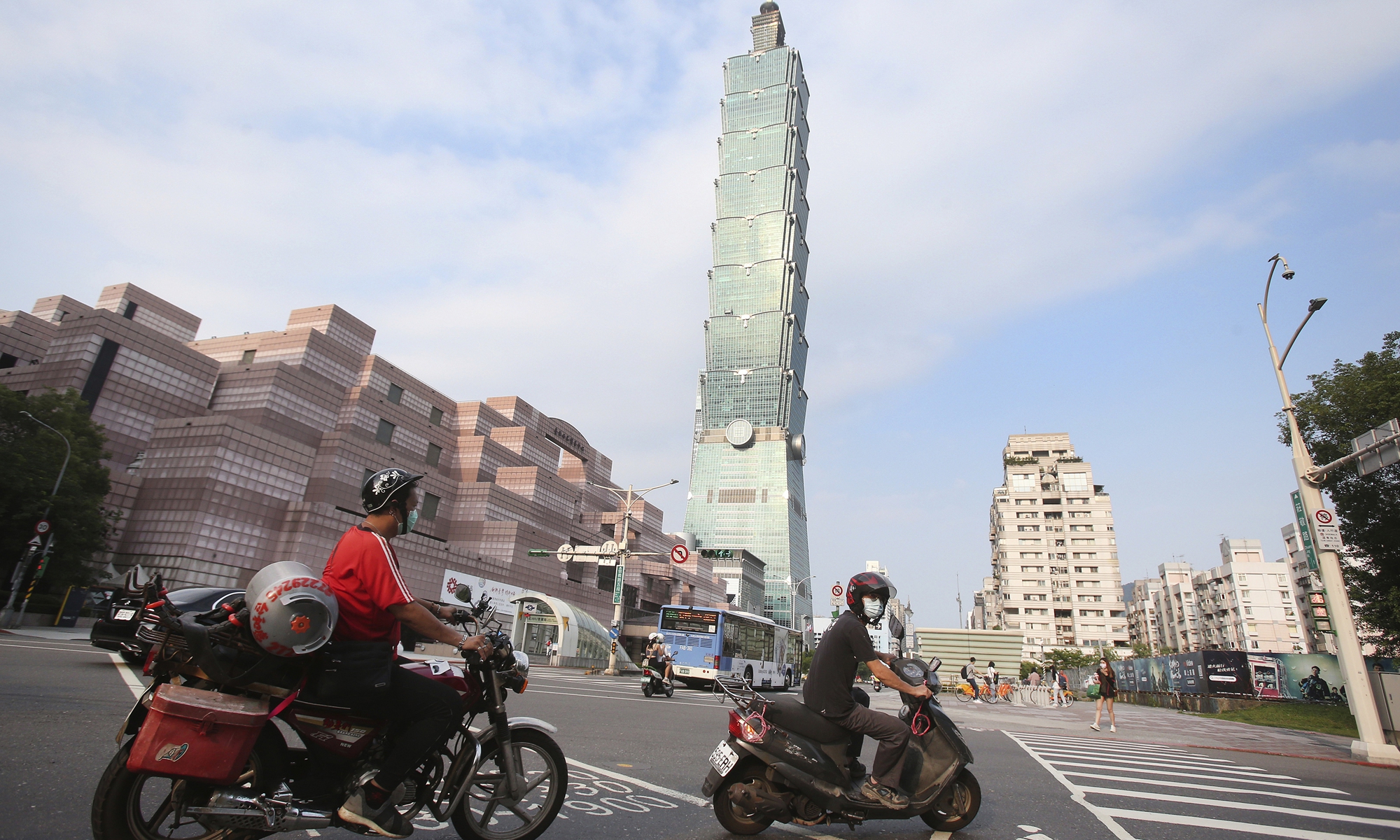
People wear face masks to protect against the spread of the coronavirus as they ride past the Taipei 101 building after the COVID-19 alert was raised to level 3 in Taipei, the island of Taiwan on May 15, 2021. Photo: VCG
While Taiwan has become one of the hottest topics in international news in 2021, and concerns over a potential war in the Taiwan Straits are rising sharply, the Chinese mainland remains calm and patient. Most interviewees from the mainland, including ordinary people and experts, reached by the Global Times are optimistic and confident that reunification will be realized for the foreseeable future.
"To reunify or not" is not a question for most Chinese people around the globe, as they only differ on how to realize it, with analysts saying that reunification is probably the biggest and most unchallengeable "political correctness" shared by the nation.
No compromise on reunification
From Chinese children to seniors in the Chinese mainland or even Chinese all over the world, they all learnt some basic knowledge about Taiwan at elementary school. Most Chinese people can name at least one or two famous scenic spots on the island of Taiwan such as Riyue Tan, or the Sun Moon Lake and Ali Mountain, and many can even sing a few lines of the folk song of the island - "The Ali Mountain Girls."
Why is Taiwan so special? Because it's an "unhealed wound" in the memory of the Chinese nation, and a mission that must be accomplished, said many interviewees reached by the Global Times.
Chinese President Xi Jinping said in his speech during a gathering marking the 110th anniversary of the 1911 Revolution on October 9 that "the Taiwan question arose out of the weakness and chaos of the Chinese nation, and it will be resolved as national rejuvenation becomes a reality."
In ancient times, Taiwan was connected to the mainland. Because of the rising sea level and geological changes, the connected land was submerged, forming the Taiwan Straits and Taiwan island. Originating from the ancient Yue people, Taiwan's indigenous people directly or indirectly migrated from the mainland. Taiwan's written history dates back to 230 AD. During the era of the Three Kingdoms (220-280 AD), Sun Quan, emperor of Kingdom Wu, sent over soldiers and officers to Taiwan. Around 610 AD (during the reign of Emperor Yang of Sui), residents in coastal areas of the mainland began to migrate to Penghu.
Later in the middle of the 12th century, the government of the Southern Song Dynasty (1127-1279) put Penghu under the administration of Jinjiang county, Quanzhou of Fujian, and sent troops to guard the territory. During the Song and Yuan dynasties, mainland residents along the coastal areas began to move to Taiwan for land reclamation. The migration's frequency and scale gradually increased during the Ming Dynasty (1368-1644).
During the Wanli period (1573-1620) of the Ming Dynasty, official documents began to formally use the name Taiwan.
In 1895, Japan defeated Qing forces in the First Sino-Japanese War, commonly known in China as the Jiawu War, and Japanese imperialists seized the island from China, marking the start of a half-century of brutal occupation and colonization with hundreds of thousands people killed as a result.
At the end of World War II in 1945, Japan surrendered to the Allies, of which China was a key member. At the surrender acceptance ceremony, the representative of China accepting the surrender announced on behalf of the Chinese government that Taiwan and the Penghu Islands were officially again incorporated into the territory of China, and all land, people and administration were put under Chinese sovereignty from that day.
However, reunification was short-lived, and after the civil war in which Communist Party of China (CPC) forces defeated the Kuomintang (KMT) who fled to Taiwan in 1949, the same year the People's Republic of China (PRC) was founded. As the Chinese People's Liberation Army was preparing to liberate Taiwan, the Korean War (1950-53) broke out on June 25, 1950. Exploiting the situation, the US sent troops into the Taiwan Straits to prevent the PLA from liberating Taiwan, and supported the Kuomintang. This is how the Taiwan question came into being.
Since then, the US has interfered in China's internal affairs by supporting the KMT to resist reunification with the PRC. But after the PRC established formal diplomatic ties with the US in 1979, Chinese people from both sides of the Taiwan Straits ceased military confrontation and started to seek a path toward peaceful reunification, and a model of peaceful coexistence before reunification.
In 1992, the common understanding, later named the "1992 Consensus," was reached between the mainland's Association for Relations Across the Taiwan Straits and Taiwan's Straits Exchange Foundation. The core of the 1992 Consensus is that the Chinese mainland and Taiwan belong to one China. This is the political foundation for peaceful exchanges and pragmatic cooperation between the two sides.
Unfortunately, the rise of secessionism on the island caused a new round of tension in 1995-96, and in the following decades, the reunification process was interrupted by secessionist forces on the island, mainly the current ruling party, the Democratic Progressive Party (DPP), as well as foreign forces, especially the US and Japan. The rise in provocations by them in recent years has led to the current tension despite continuous efforts made by the mainland to promote peaceful exchanges and cooperation with the island.
"Based on these facts of history, it's not hard to understand why reunification is so important to the Chinese people. They have made endless efforts and sacrifices to realize this goal in the past century no matter how big the difficulties were, so how could they give up just because the US, Japan or some secessionists on the island want to stop them?" said a Beijing-based expert on Taiwan studies who asked for anonymity.
"If Western people don't understand just how serious the Chinese are on the matter of reunification, let's put it this way - reunification is an uncompromising demand shared by the whole nation, and no matter who is governing the country, it must respond to this demand and promise the people that the mission will and must be accomplished, otherwise it has no legitimacy to govern," Shen Yi, a professor from the School of International Relations and Public Affairs at Fudan University, told the Global Times.
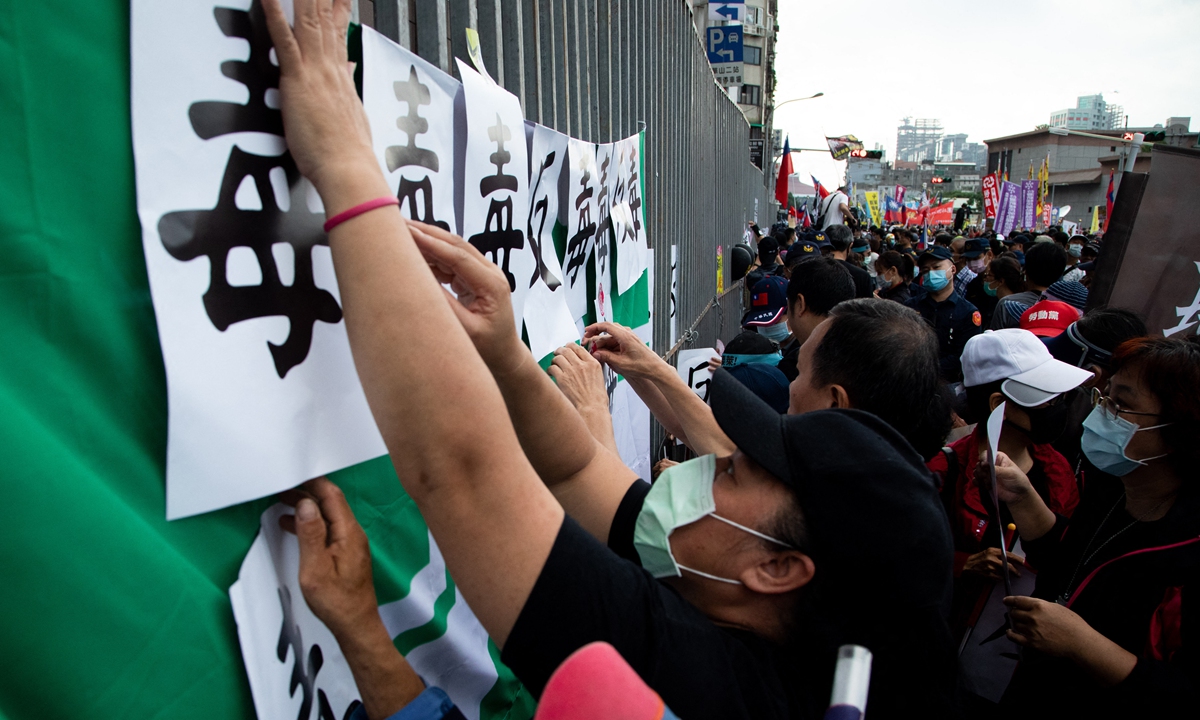
People stick signs that read "poison" in front of the Democratic Progressive Party's headquarters during a protest in Taipei on November 22, 2020. Photo: AFP
Reunification with Taiwan has nothing to do with nationalism or ambitions of territorial expansion as some Western media and politicians describe. "It's nonsense," Shen said, stressing that reunification is a demand for justice by the Chinese people to end the century of humiliation and heal the wounds inflicted by imperialism and colonialism, and no one has any right to stop it.
Li Fei, a professor from the Taiwan Research Institute at Xiamen University, said Xi's remarks send a clear signal: reunification is an essential part of the Chinese Dream, the dream of rejuvenation, or in other words, reunification is the preface of the great rejuvenation of the Chinese nation. Without reunification with Taiwan, the rejuvenation cannot be realized.
"The closer you get to the rejuvenation, the more mature the conditions will be for us to solve the Taiwan question. We are approaching this goal now, but it's not the right time yet. China is still preparing and we have the patience and confidence to solve the question in an ideal and peaceful way which will minimize the costs," Li noted.
But if secessionists on the island and the US cross a red line which directly threatens the development of China and which could cause the island to separate from the country, "it's entirely possible for the Chinese authorities to solve the question once and for all in a non-peaceful way," Li noted.
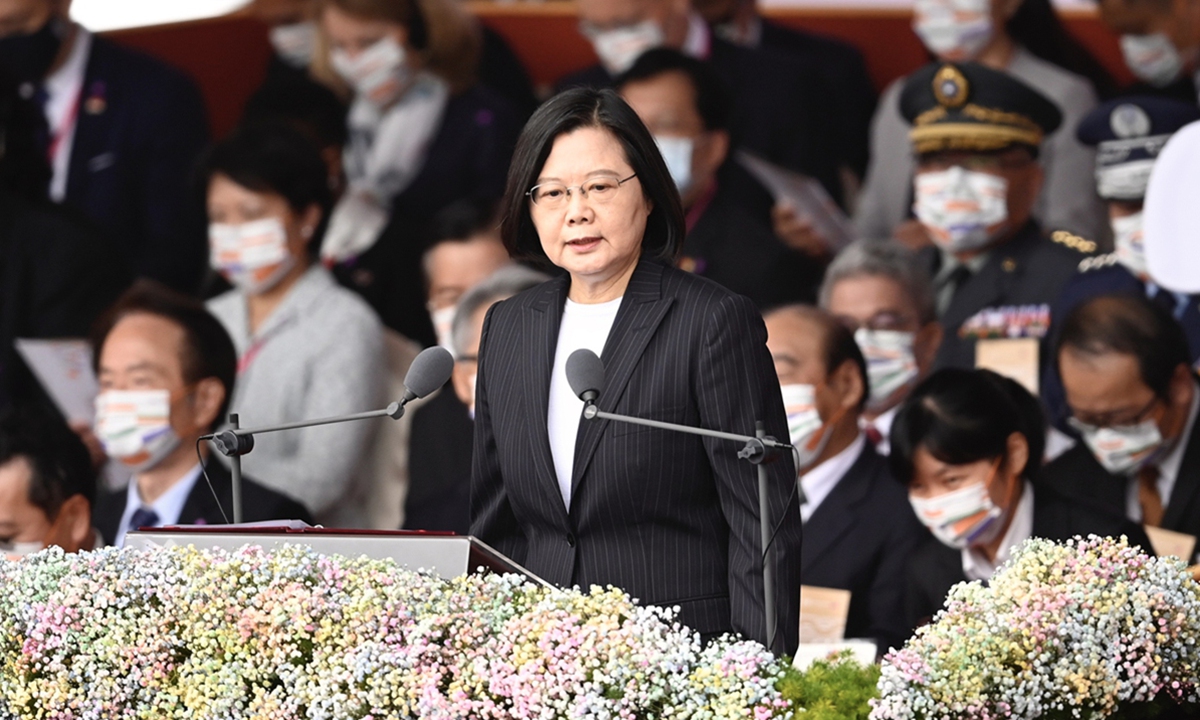
Tsai Ing-wen, the regional leader of the island of Taiwan and the pro-secessionism Democratic Progressive Party (DPP) speaks during the "Double Ten" address in Taipei on October 10, 2020. Photo: AFP
Source of angerIn recent years, especially after a series of tensions in 2021, many observers and analysts worldwide worry that the possibility of a non-peaceful solution is increasing. John Mearsheimer, a prominent American scholar of international relations, believes that no flashpoint between the superpowers in the Cold War was as dangerous as Taiwan is today.
A feeling shared by most interviewees, which differs from the narrative of mainstream Western media, is that the current tension was not initiated by the mainland, but the rising provocation from the secessionist DPP authority on the island, and the US which is playing the "Taiwan card" to contain China.
The tension has also caused rising sentiment about "reunification by force" on Chinese social media while official voices of the mainland still adhere to the basic policy of a peaceful reunification.
Jin Canrong, associate dean of the School of International Studies at the Renmin University of China, said that in the first term of Tsai Ing-wen, head of the DPP and the island's regional leader, which started in 2016, the mainland was still being patient and pragmatic, and gave her a chance to continue peaceful ties with the mainland based on the 1992 Consensus.
But the DPP insisted on abandoning the 1992 Consensus to seek secessionism. After the DPP used the 2019 Hong Kong turmoil to hype fear and hatred against the mainland to serve its re-election campaign in 2020, cross-Straits relations deteriorated. The DPP authority even banned medical materials export to the mainland after the COVID-19 pandemic hit Wuhan in late 2019 and early 2020, the time when mainland people desperately needed help.
"Even foreigners from Russia, Pakistan or Iran were providing masks to us, how could Taiwan, which we consider as our compatriots in one big family, treat us with such cold blood?" said a resident in Wuhan with anger who asked not to be named.
In 2021, the mainland showed sincerity to donate COVID-19 vaccines to Taiwan, but the DPP authority also refused the sincerity with a hostile attitude, and demonized and smeared the mainland-made vaccines. The US has also increased supports to incite Taiwan secessionism diplomatically, politically and militarily from the Trump administration to the Biden administration, so many Chinese believe that to stop China from reunification is a bipartisan consensus of the US, so they have been further infuriated.
A cartoonist identified as "JeffHoly" on Sina Weibo released a series of drawings that illustrate national reunification as it would be executed by the People's Liberation Army (PLA) on Chinese social media, which received hundreds of thousands of likes. Many web users said "I hope this will come true as soon as possible."
JeffHoly told the Global Times that since his works have received more than 5 million views on his own Sina Weibo account, he believes his cartoons are so popular because many people are waiting for the doomsday of Taiwan secessionists, and they want to see these betrayers of the nation punished.
"The message I want to convey via my cartoons is about our anger toward the secessionists. I want to tell the secessionists on the island that their doomsday is coming," he noted.
Some foreign journalists said his works are full of extreme nationalism and war-like sentiment, but JeffHoly rejected the characterization. "When the DPP authority spreads hatred against the mainland, when some Taiwan pro-secessionist media hype fear and discrimination toward us, where are those foreign media? Do they speak for us or criticize the DPP? Do they know who should be blamed for the current situation?" the cartoonist said.
This kind of feeling is real, and shared by many in the mainland. Jin said "now the voice of urging reunification by force prevails the mainland's social media to some extent."
Interviewees from Taiwan reached by the Global Times said they feel sorry and apologized for this, but they stressed that compatriots in the mainland should not confuse the DPP authority and secessionists with the vast majority of people on the island. They said they are helpless in influencing the behavior of the DPP authority, and believe the mainland people are kind and sincere toward ordinary Taiwan people.
Perishing patience
Most people in the mainland understand the Taiwan compatriots and the DPP authority are different, but many are tired of waiting for a positive response from Taiwan to the long-standing sincerity of "peaceful reunification" proposed by the mainland. They believe the Taiwan authorities have betrayed the sincerity from the mainland, the economic benefits that the mainland provides to Taiwan are ineffective in convincing the authorities to seek reunification with the mainland, Shen said.
These people found that the all kindness, sincerity and benefits that the mainland has offered to the island have turned into a negative outcome in recent years - the DPP has poisoned cross-Straits ties by spreading secessionism and hatred against the mainland, and it keeps weakening recognition of Chinese national identity among the people on the island by manipulating historical education and propaganda. It has made the island a "cash machine" for the US military industrial complex and "a pawn" to serve the US strategic interest to contain China.
"The sentiment of 'reunification by force' might be irrational and radical to some extent, but outsiders should understand why Chinese people are getting so disappointed and angry. They weren't born to be hawkish. The real source of the anger is the behaviors of Taiwan authorities and the US behind them aren't offering any hope for a peaceful reunification, but instead keep provoking and infuriating them," Shen said.
A student based in Taipei, Taiwan island, surnamed Mei, 23, told the Global Times that "in the past, I didn't understand this kind of anger in the mainland, and I found it's ruthless and extreme, because as a resident of Taiwan, I used to think that it was the mainland who bullies Taiwan and so we are legitimized to fight back."
"But now, after I learnt the facts covered up by the DPP authority and started to think from the perspective of the mainland people, I found the anger is understandable, because the mainland people have treated us as compatriots, but the Taiwan authorities return this with hatred and provocation rather than appreciation and respect," she said.
"So the people in the mainland will surely be offended, and the problem is that the politicians who rule Taiwan should take responsibility for the worsening cross-Straits ties," Mei noted.
If the US and the Taiwan authorities do not want military tensions in the region, they should fix the mess they made, and let the mainland see the hope of a peaceful reunification, otherwise it will be impossible to ease the tension. Sentiment that urges reunification by force will continue to rise and one day, the hope of a peaceful solution may totally perish, said experts.
Unfortunately, although the US understands what China wants, based on the strategic demand to maintain US dominance in the West Pacific, Washington will not allow Beijing to take back Taiwan, a strategically important island, without a fight, so the Taiwan question is unlikely to be solved through negotiation, said Mearsheimer.
But Wang Yiwei, director of the institute of international affairs at the Renmin University of China, said when China is powerful enough to deter the US from intervening in the Taiwan question militarily, the US will give up and consider negotiation, because Taiwan is not a core interest of the US, so the hope of peaceful solution still exists.



